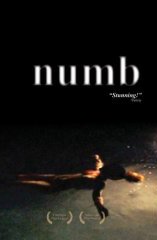
Science fiction is one of the few genres capable of criticizing the present and predicting the future, merging curiosity and apprehension with human longing. From the technological innovations second-guessed by Jules Verne to the amoral atrocities predicted by H. G. Wells, science fiction has served as both a blue-print and warning of our species' innovations and failings. This is particularly true in the fiction of Ray Bradbury and George Orwell, each of which envisioned societies wherein the individual lost individual freedom to an overruling political machine. This same sense of injustice was captured cinematically by films like Alphaville, THX-1138, and Clonus, each of which glimpsed into dark futures where ideals were placed before human individuality, and freedom became a dream stomped on by the status quo. Numb, the newest dark offering from Heretic, explores similar themes as these classics, albeit on a smaller budget and less depth A nihilistic look into the dystopian future, this scathing portrait of dangerous technology and obsessive desire laments our loss of humanity and morals with unnerving style and honesty, making it one of the more effective films of its type in some time.
In a future where the very things that make us human have become suspect, unwanted, and nigh impossible to hold onto, a woman dares to face the emotional tragedies of her past to endure the future . . . and rediscover what it means to be human. Combining mythology with science and politics, this intellectually challenging story features mindless machines that serve the function of angels or messengers/help mates. Created from the computer-scanned bodies of people whose desire for physical immortality is so great that actually 'die' to achieve it, these machines function as 'angels' who watch over us/help guide the decaying civilization of future Earth. Claire, an emotionally damaged yet strangely sincere woman, must face a bleak future to better understand a crippled past, using as her guide Miles, the last security officer of Yerba City. As she gets closer to her goal, she also gets closer to Miles, descending deeper into a world of hopelessness, betrayal, and sexual addiction.
"A visually stunning emotional struggle for what it means to be human in a world of inhuman circumstances" summarizes the themes and depth of this film. Philosophically rich, emotionally scathing, and as rich with intellectual stimulation as it is with searing passion, Numb follows the internal/external journey of a very real, very passionate human character throughout a world itself void of all compassion, depth, or mercy. Love, honor, wisdom -- all are little more than words in a world whose political structure and overreaching philosophy so disturbingly mirrors our own period. As fable, modern myth, and metaphor, the film presents us with a mirror image of our own society, forecasting what our power-hungry politicians and soul-dead 'average citizens' are driving us to. Mob mentality and technology too powerful for our animalistic minds provide the cataclysmic events herein, and writer/producer/director Michael Ferris Gibson does a wonderful job balancing the various themes. The result is a piece of dystopian science fiction that merges honest-to-god philosophy and cultural criticism with a powerful story. Moral ambiguity is just as much a character here as the human and robotic players, and just as crucial to our appreciation of the theme. Careful never to preach outright, the script emphasis character and plot, allowing its more subversive themes to grow as a result of natural storytelling. The 'fallen angels' are mythically pleasing and sure to raise the eyebrows of many a conservative. The noir-like exteriors and use of minimal lighting drapes action in an appropriately expressionistic hue. Of further effect is the continual juxtaposition of color and black-and-white scenes, representing the present and past respectively. The "Drip" substance that hooks an entire population is a terror surpassed only by a culture already hooked on hunger itself. This element of our nature is perhaps the 'monster' of the film.
The visual presentation of Numb is quite good for a film of such a low budget. Its use of minimal colors, dark moody shadows, and realistic skin tones mirror the general tone and psychology. The film is presented in 16:9 widescreen, and despite some grain, little distortion is present. Audio is crisp in Dolby 2.0. Special features are scant but worth while, including the director's commentary, three deleted scenes, and trailers for further Heretic features. The commentary is the most significant supplement, offering the director's view of his material and approach to the story while depicting an overall sense of his own personality as he discusses everything from his early company to the struggle to find locations. A decent package of a surprisingly serious film, Numb is both an homage to German expressionism and a science fiction film that question where our old, tired species might be headed.
Review by William P. Simmons
| Released by Heretic Films |
| Region 1 - NTSC |
| Not Rated |
| Extras : |
| see main review |